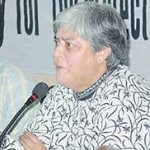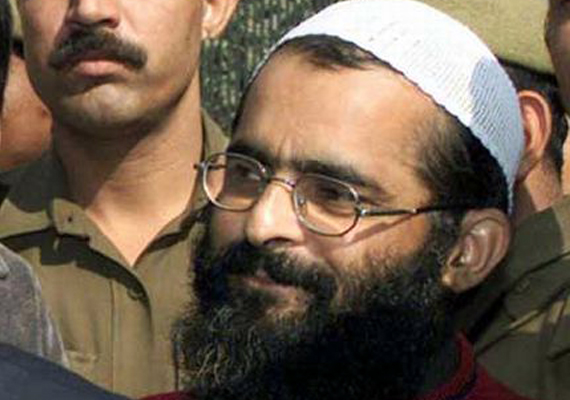What did it take to defend Parliament attacker Afzal Guru in court? In her book, lawyer Nandita Haksar explains all.
 by Humra Quraishi
by Humra Quraishi
I confess I am appalled by the Afzal Guru hanging. Hanged and buried in absolute secrecy, without informing his family and without sensitivity to basic human rights – but there is also a bigger picture here.
I did not know Afzal Guru and had never met him. A few years ago, I read his lawyer, the respected activist and human rights campaigner Nandita Haksar’s book, Framing Geelani, Hanging Afzal: Patriotism In The Time of Terror. Published six years ago by Bibliophile South Asia, I had attended its launch here in New Delhi, where some of our best-known academics spoke as well.
Former Vice Chancellor of Delhi University, Professor Upendra Baxi was one of the speakers, and all of them focused on some  harsh realities in terms of human rights violations, biased machinery, communal politics and so on. Reading the book later, several more realities hit me, through the series of open letters that Nandita (in pic on right) writes, including one to Prime Minister Manmohan Singh, where she highlights the brutalities this system heaps on its people.
harsh realities in terms of human rights violations, biased machinery, communal politics and so on. Reading the book later, several more realities hit me, through the series of open letters that Nandita (in pic on right) writes, including one to Prime Minister Manmohan Singh, where she highlights the brutalities this system heaps on its people.
If the top rung of our current leadership would take the time out to read this volume, they would not be able to sleep at all. The 348-page volume carries all the possible facts about SAR Geelani and Afzal Guru in the context of this case, and the serious offshoots that follow.
I reread this book on Saturday, as the morning brought the news of Afzal Guru’s hanging. I quote Nandita from her book, more specifically from the chapter, ‘Letter to Prime Minister Dr Manmohan Singh’:
‘I am sure you know that I have been part of the defence team of SAR Geelani, the man who was first sentenced to death on charges of conspiring to attack the Indian Parliament, and then acquitted by the High Court of Delhi. I have been accused of being anti-national and people have expressed shock that a daughter of a nationalist father should betray his ideals. I feel the need to explain why I took up the case and what I learnt about our country in the course of this case…
‘I do not know how many Kashmiri prisoners there are in Tihar Jail. Most of these men are locked inside the high security cells of the jail. They are denied basic facilities and are subjected to torture and brutalities inside the jail, and often their lives are in danger. There were at least two attempts on the life of Geelani while he was in jail. More recently, two other prisoners have been attacked inside the high security cells of the Tihar Jail.
‘I have details of other atrocities, brutalities and crimes committed by the jail authorities. Where do I go and file a complaint? I feel so helpless, despite being a lawyer and well-connected in society, what do you think the Kashmiris feel? Can we win the hearts and minds of the Kashmiri people by treating them like subhuman beings?’
With that start, she takes the reader to what’s been happening inside and outside our jails and prisons, and in the corridors of power and in those international and national conferences. This volume is a must-read for those who want to study the facts around the Afzal Guru case in the context and backdrop of the prevailing political scenario. Nandita has laid out every single detail, right from the basic ‘why’ she took up this particular case, to the very system and police machinery, and everything else in between.
I also known Afzal Guru’s other lawyer, ND Pancholi. On two earlier occasions, I had asked him about Afzal’s conduct in jail. He had said, “He keeps reading the Quran and praying…he is kept in isolation, but he is calm.” Pancholi was also of the firm view that Afzal was implicated in the case would never get a fair trial.
After the hanging, our ‘democratic’ setup gagged the protests and mourning in the Valley with a curfew. Here, in New Delhi, right wing goons blackened the faces of left wing protestors, all under the watchful eyes of the cops. Added to this, senior journalist Iftikhar Gilani (who works with DNA) and his family were detained and questioned for several hours in their South Delhi home.
I end this piece with lines by Turkish poet Nazim Hikmet, who spent 35 years in prison because he was a Communist:
‘The moment you’re born
they plant around you
mills that grind lies
lies to last you a lifetime.
You keep thinking of your great freedom
a finger on your temple. Free to have a free conscience.
Your heart bent as if half –cut from the nape,
your arms long, hanging,
you saunter about in your great freedom: you’re free
with the freedom of being unemployed.
You love your country as the nearest, most precious thing to you.
But one day, for example,
they may endorse it over to America,
and you too, with your great freedom – you have the freedom to become an airbase.
You may proclaim that you must live, not as a tool,
a number or a link, but as a human being.
Then at once they handcuff your wrists.
You are free to be arrested, imprisoned and even hanged.
There’s neither an iron, wooden
nor a tulle curtain in your life;
there’s no need to choose freedom:
you are free.
But this kind of freedom
is a sad affair under the stars.’
Humra Quraishi is a senior political journalist based in Gurgaon. She is author of Kashmir: The Untold Story and co-author of Simply Khushwant.
(Featured image courtesy deccanchronicle.com)


